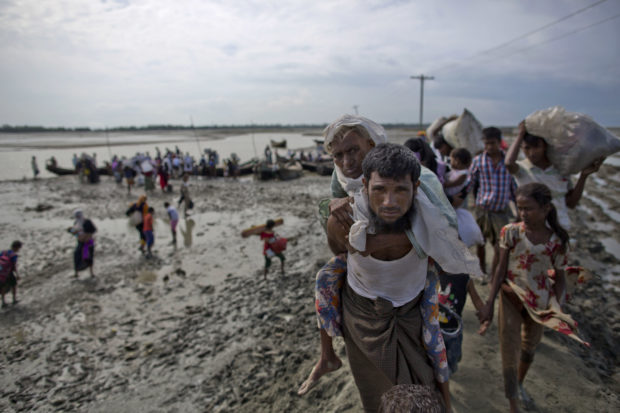
AP FILE PHOTO
Fresh hope for more than 600,000 victims of Asia’s worst refugee crisis arrives in the next few days with international summits in Vietnam and the Philippines.
“The Rohingya crisis is of gargantuan proportions and needs to be treated with utmost urgency,” said Bill Frelick, refugee rights director at Human Rights Watch (HRW), on Wednesday.
Releasing HRW’s “Ten Principles for Protecting Refugees and Internally Displaced People Arising from Burma’s Rohingya Crisis”, Frelick urged leaders at the upcoming Apec and Asean summits to place the rights of the Rohingya at the top of their agenda.Since a crackdown by Myanmar troops in late August, more than 600,000 Muslim Rohingya refugees have fled to Bangladesh while hundreds of thousands of internally displaced people remain in Myanmar’s Rakhine state.
Myanmar claims the Rohingya are Bengalis – modern interlopers from neighbouring Bangladesh – and refuses to give them citizenship rights despite their residence in Rakhine for generations.
“Leaders should call Rohingya refugees what they are: ‘Rohingya refugees,’” Frelick said. “Governments should not use euphemisms or otherwise mince words to suggest that these are not refugees deserving of all their rights as refugees or to deny their ethnic identity and nationality ties to Burma.”
The “Ten Principles” are intended to guide governments and humanitarian agencies as they address the refugee crisis. They include an urgent call on donor governments to provide generous support to meet the humanitarian needs of Rohingya refugees.
HRW also called on the Bangladeshi government to keep its border open to asylum seekers and not coerce return of refugees to places where they would be persecuted.
The United Nations has termed the Rakhine crackdown a “textbook case of ethnic cleansing” but Security Council (UNSC) members China and Russia have resisted moves for international intervention.
On Monday the UNSC urged Myanmar government to end excessive military force and intercommunal violence, and to join hands with Bangladesh to enable voluntary repatriation of Rohingya. It also called on the Myanmar government to end excessive military force and intercommunal violence.
Dhaka and Nay Pyi Taw have agreed to set up a joint working group by November 30 for the repatriation of Rohingya. Myanmar has said it will accept back refugees who meet certain criteria, but has failed to elaborate on the details of that benchmark.It has also indicated that Rohingya who wish to return to Rakhine should live in camps for internally displaced people.
Camps for displaced people and “safe zones” in Myanmar are not an acceptable solution for returnees, Human Rights Watch said.
The Rohingya were stripped of citizenship rights by the 1982 Citizenship Law, which led to restrictions on their movement, and limited access to healthcare, livelihood, shelter and education as well as arbitrary arrests and detention. Intercommunal tensions in Myanmar are being fueled by a nationwide resurgence of Buddhist nationalism that has targeted Muslims and other minorities.